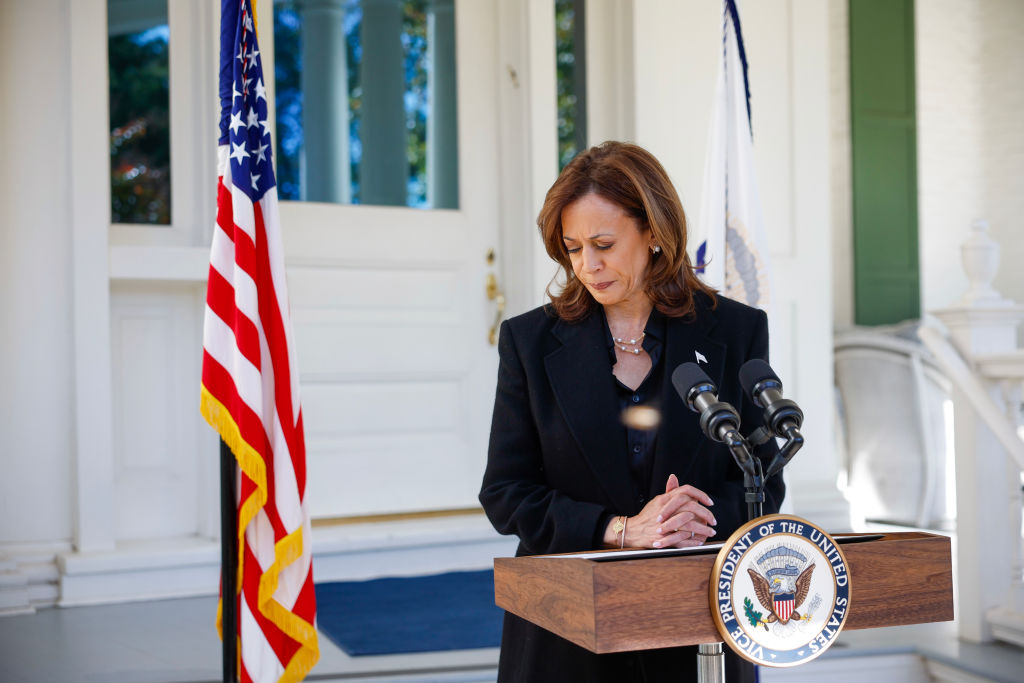Political punditry is a ridiculous profession at the best of times, but next month it’s going to turn surreal.
Despite the careful ass-covering from data nerds that it’s silly to make predictions with the polls as close as they are, the race is plainly trending toward Donald Trump. Kamala Harris’ lead, which reached 2.2 points in the national average earlier this month, is down to 0.2 points as I write this. Trump is at 48.5 percent and rising, making it not unthinkable that he’ll win the popular vote. And it’s not just trashy right-wing partisan polls that are driving his gains: New surveys from mainstream outlets like CNBC and the Wall Street Journal have him leading by 2 and 3 points, respectively.
It’s the same story in the swing states. Polls of Pennsylvania released this morning by Emerson and Franklin & Marshall, both well-regarded, have Trump leading Harris by a point. Last month, to have faith that she would pull this out, you simply had to believe that there won’t be a polling error in Trump’s favor this year. To expect that she’ll win now, you need to believe that there will be a polling error—in her favor. And if the trend toward Trump continues, that error will need to be larger and larger.
The “vibes” have also grown terrible for what’s always been a vibes candidacy, and not just because of polling. The fact that Harris recently ditched her Obama-esque “joy” message for Biden-esque warnings about the menace of Trumpism stinks of panic, an admission that the first approach wasn’t going to get her to 51 percent and that the situation has turned desperate. And some of her coming campaign events suggest she’s out of ideas. Her appearance in Texas(?) will feature Beyoncé in the hope that a last-second celebrity shiny object might motivate someone, anyone, to vote. Her closing argument will take place at the Ellipse outside the White House—the same spot where Trump held his rally on January 6, just in case the thousandth “Orange Man Bad” warning to the electorate turns out to be the one that finally tips the scale.
She’s right that the Orange Man is Bad. He’s the most grossly unfit candidate who’s ever stood for the presidency. It will be a stain on the country forever that he was elected not once but twice, the second time after a coup attempt. But most Americans simply don’t care—and Harris, like so many of us, is at a loss about how to make them.
So here’s the way the already ridiculous profession of political punditry will turn surreal next month, after Trump wins. Not knowing what else to do, most of us will tap out the same pedantic election postmortems that we do every four years, thoughtfully analyzing where the loser went wrong strategically. But in this case, those analyses will sound something like this: “If only Harris’ ground game had been slightly better, she might have inched past a guy who’s been called a fascist by multiple members of his own Cabinet.”
Or this: “If Harris had fleshed out her program a bit more, she might have barely defeated a mentally declining 78-year-old prone to digress on the stump about the size of Arnold Palmer’s dong.”
Or this: “If Harris were less clumsy in interviews, she might have gained an edge on a man who’s literally incoherent when discussing policy and whose economic agenda appears to be based on magic.”
I won’t do it. I’m willing to be ridiculous, as my profession requires, but normalizing a Trump victory as a rational reaction to Harris’ strategic mistakes is beneath my dignity and yours. Americans wanted a non-senile Democrat on the ballot; they got a non-senile Democrat on the ballot; they preferred a coup-plotter anyway. There’s your postmortem. If it makes you feel better about your country to believe that Gretchen Whitmer as nominee might have narrowly eked out a win over Trump instead of narrowly losing to him, as Harris will, embrace the cope.
If you’re hellbent on finding explanations for this election that don’t force you to accept that America has rotted away, here’s the best I can do to help: Through not much fault of her own, Harris was at a serious disadvantage due to “the vision thing.”
The liberal status quo.
The strongest criticism of her campaign, I think, is that she never “defined” herself. I suspect she thinks so too: A candidate as bad at interviews as she is wouldn’t be on a media blitz right now unless she believed that not filling in the blanks about herself had become more risky than filling them in awkwardly. Even at the debate, notes election analyst Sean Trende, she did a stellar job of exposing Trump but squandered an opportunity to give viewers a strong sense of her own politics. What kind of president would Kamala Harris be? What’s her vision for the country?
Voters never got a good answer. But tell me this: Realistically, was there any good answer for her to give?
She could have presented America with a bold progressive vision of the future a la her 2019 campaign for president. She would have been annihilated had she done so. She also could have tacked hard to the right, I suppose, going further on immigration enforcement and supporting Israel than she already has. But she would have lost that race, too.
Her best chance to win was to run as a centrist. What is the centrist “vision” for America, precisely?
“The vision thing” is a term that was used by Vice President George H.W. Bush in 1987 as he prepared to run for president. Ronald Reagan, the man he served under, had swept to the White House with a bold small-government, conservative vision for the country. Bush wasn’t an ideologue like Reagan, though; he was a soft-spoken technocrat. So when he referred in an interview at the time to “the vision thing” that voters loved about Reagan, the awkwardness of the phrase seemed to betray how foreign the concept was to him. George H.W. Bush was no visionary.
What he was, simply, was the most personally accomplished person to become president in the last 50 years and did the best job in office of anyone in my lifetime, in my opinion. Despite lacking “the vision thing,” he won more than 400 electoral votes in 1988.
Bush didn’t have a “vision” for the country. Neither did Bill Clinton. George W. Bush didn’t have much of one either in his first term. (“Compassionate conservatism,” I guess, whatever that meant.) He did have a vision in his second term—making the world safe for democracy, by force if need be—but it didn’t work out great.
Barack Obama was a visionary in 2008 if you count burbling about “hope” and “change” as a vision, but by 2012 that was gone. Neither he nor Mitt Romney offered anything much grander that year than keeping the other party out of power. Hillary Clinton’s campaign was so devoid of purpose in 2016 that I can’t summarize its message except with the words “her turn.” And in 2020 the closest thing Joe Biden had to a vision was ousting Trump and returning America to how it had been four years earlier.
Centrists don’t do “vision.” They’re not civic engineers. They react to problems as they emerge—to the extent the electorate will let them. In theory, Kamala Harris could have run a sober campaign about how to solve the momentous fiscal crisis presented by the entitlement state and the debt servicing that sustaining it requires. How do you suppose that would have worked out for her on Election Day?
Whatever else one might say about Trump, he is a visionary. He has a very particular idea about how America should operate, as John Kelly would tell you. In a country where the right track/wrong track numbers have been deep underwater every day for the past 15 years, a visionary candidate who wants to try something radically different will have an appeal that a milquetoast vowing to defend the liberal status quo will struggle to match. Even if that “something different” is poisonous.
And that’s probably truer now than it was in George H.W. Bush’s day. Americans derive much more of their personal identity from political tribalism in 2024 than they did when I was younger. A visionary candidate offers many voters the sort of affirmative identity they crave. A centrist offers mush.
Build the wall, America First, mass deportation, tariffs on everyone, fight the enemy within: That’s not just a vision, it’s a vision in blazing neon. What sort of vision could Kamala Harris plausibly have proposed that would have outshined that neon, constrained as she is by the parameters of centrism?
It takes a mature electorate to prefer a candidate who’s offering little more than muddling through when the alternative is pitching miracle cures for everything. That’s not the electorate we have.
None of this is to excuse Harris for failing to distinguish herself from her widely disliked boss. She could have “defined” herself as a centrist somehow without making the God-awful mistake of endorsing everything Joe Biden has done as president, an error she was still refusing to correct as recently as last week.
But in a country as chronically discontent as America, she faced a real challenge from the jump as a status-quo centrist trying to defeat a visionary. And not just any visionary, but one who practices fantasy politics.
Back to the future.
For nine years, Trump has said that it’s time to make America great again. And for nine years, he’s been characteristically cagey about when, exactly, he believes America was “great.”
Was it his personal heyday of the 1980s? The 1950s of his childhood? Before the civil rights era? Before the Civil War?
“We need to go back to 1798,” he told a crowd a few days ago, referencing when the Alien and Sedition Acts were passed. Last month he named a different decade: “Our country in the 1890s was probably the wealthiest it ever was because of a system of tariffs,” he claimed, which it will surprise you to learn is not true.
But short-term nostalgia is also on the table. “Are you better off now than you were four years ago?” he asked another audience on Wednesday. Nooooooooo, the crowd replied. If you remember what America was preoccupied with in 2020, the last year of Trump’s presidency, you know that isn’t true either.
The reason there’s no fixed answer from him about when America was great is that the pitch is designed to evoke an emotional response, not to pin Trump down to some particular era’s political zeitgeist. The listener is free to assume that he’s referring to whichever period they personally idealize; it’s practically the human condition to prefer the world of one’s youth to the world of today. And in a country where the economy, race relations, and gender roles have changed a lot in our lifetimes, that preference can be potent.
Beyond ridding the country of immigrants to prevent them from further “poisoning the blood,” there isn’t much more to Trump’s “make America great again” pitch than a fantasy about returning to whichever national golden age happens to dominate a particular right-leaning voter’s imagination.
And insofar as he’s gotten more specific lately by naming particular policies from particular years, I think he’s trying to guide that fantasy: However dark and oppressive his second term gets, he’s suggesting, you can rest easy knowing that there’s precedent for it. He’s making Americans comfortable with an ominous future by assuring them that they’re really just returning to the country’s glorious past. ”We love the way the ruling class treated undesirables back when America was great, don’t we, folks?”
Kamala Harris, hemmed in by centrism, somehow had to “define” herself vividly enough to outcompete that fantasy with undecided voters who, in spite of everything, remain open to returning Trump to office. How?
Her solution was to pander shamelessly to discrete constituencies, hoping to buy off voters before they defected to Trump. But even there, she’s competing with fantasy politics.
Trump’s new habit of wooing different groups of voters by promising to repeal taxes that hit them especially hard feels less like politics than a game-show host awarding prizes. (Go figure, as he’s a game-show host by trade.) Charles Cooke has compared it to Oprah Winfrey waltzing out onstage at her show and telling audience members, “You get a car! And you get a car!” No tax on tips, no tax on overtime, no tax on Social Security income, no cap on deducting state and local taxes, deductions for interest on car loans—he’s proposed all of it, no doubt with more to come. Earlier this week he suggested eliminating the federal income tax entirely and relying on tariffs to fund the government, an idea so regressive, economically destructive, and fiscally insane that even his Republican cult in Congress wouldn’t pass it. I think.
Believing that all of this tax-slashing can work without commensurate spending cuts is the purest of fantasies, but that’s what he’s offering. One recent analysis of his scheme to cut taxes on Social Security income found that it would leave the program insolvent by 2031 (two years ahead of current projections) and force an automatic 33 percent cut in benefits. A separate analysis of his plan to extend the tax cuts of 2017 determined that deficits would rise by $7.5 trillion over 10 years as a result, double the impact of Harris’ program.
For ages, the American left has labored under a fantasy about whether the federal government’s obligations are sustainable. Now here’s Trump, willing to say anything to get elected and spare himself from prison, offering them a program so preposterously irresponsible that even Harris can’t bring herself to outbid it. He can’t explain how his tax policy is supposed to work, but he doesn’t need to: Like any demagogue, he’s offering the fantasy that all national challenges are ultimately a matter of will. The solutions to complex problems are easy, even obvious; all you need is a leader with the “strength” to implement them.
He’s going to nuke the world with tariffs. All of America’s problems will be solved. Trust him. How should Harris “define” herself to win over a population juvenile enough to entertain fantasies as moronic as that?
In the end, I think, she’s caught in the same absurd dilemma that pundits will be caught in after the election. She has to approach politics in the Trump era somehow normally and not normally at the same time, and that really can’t be done.
In three weeks, for instance, the commentariat will be writing pedestrian postmortems of Harris’ strategic choices while, all around them, America convulses. Either she’ll have won, triggering another coup attempt by scumbag Republicans, or she’ll have lost and something like 50 million people will suddenly be questioning their identities as Americans. How do you do normal horse-race analysis in a moment as abnormal as that? We’ll find out.
The same goes for Harris’ strategic options over the final two weeks. She could downplay the “Orange Man Bad” stuff and go all-in on a “normal” political attack by, say, highlighting the fiscal havoc Trump’s Social Security plans would cause. Or she could stick with the “Orange Man Bad” material about how abnormal he is to try to drive home the urgency of the moment and finally scare undecideds into caring.
But I think her message will seem muddled if she tries to do both. If she says, “My opponent will end democracy—and, by the way, he’ll force grandma to eat cat food for dinner,” it’ll sound like she’s unserious about the first point. If you really believe Trump is a fascist who’ll threaten the Constitution, as Harris claims to, you don’t just tuck that into a list with “normal” political criticisms. You shout it from the rooftops. Making it one small part of a broader critique risks looking like you’re throwing everything at the wall and hoping something sticks.
Maybe this is the proper postmortem for her campaign, then: Ultimately, the degree of difficulty was too high. Biden was too unpopular, inflation was too potent, immigration was too badly mishandled, and Harris was too mediocre a politician to overcome all of it—although she’ll end up getting surprisingly close. Most of all, though, too many Americans were too comfortable with authoritarianism for a “this isn’t who we are” pitch to work. It is who we are, or enough of us, anyway. This is the vision we want. This is “normal” now.










Please note that we at The Dispatch hold ourselves, our work, and our commenters to a higher standard than other places on the internet. We welcome comments that foster genuine debate or discussion—including comments critical of us or our work—but responses that include ad hominem attacks on fellow Dispatch members or are intended to stoke fear and anger may be moderated.
With your membership, you only have the ability to comment on The Morning Dispatch articles. Consider upgrading to join the conversation everywhere.